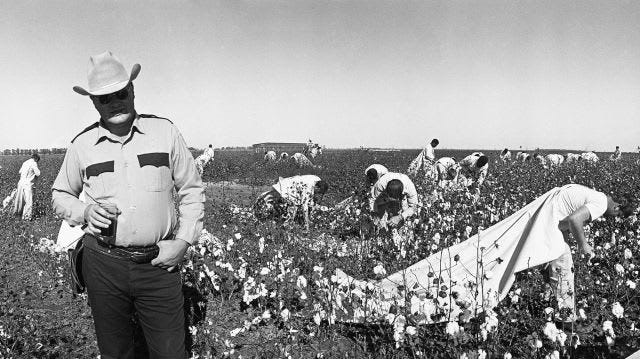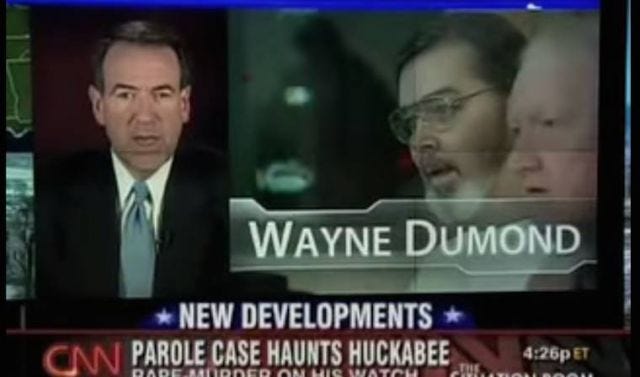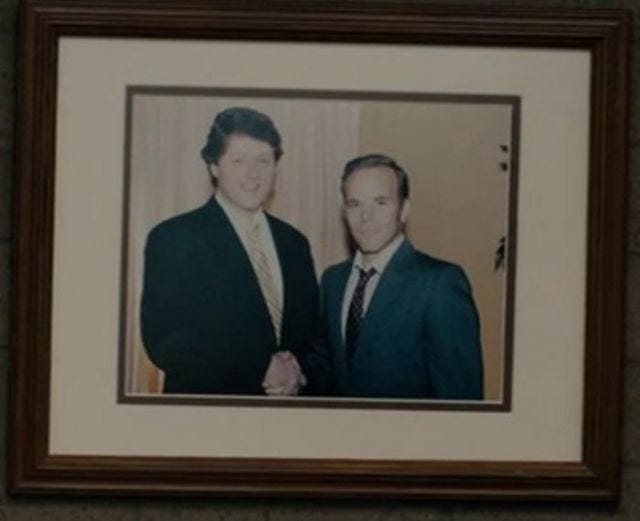The latest season of True Detective on HBO takes place in Arkansas, in the fictional town of West Finger, and follows the case of the abduction and murder of two children across three decades. The show flashes back and forth between 1980, 1996, and 2015 as the detective on the original case obsesses over solving it, only to be thwarted time and time again by corrupt politicians and false leads. There is a person eventually convicted for the crime, who may or may not have been innocent, and the detective holds doubts about the case throughout his life.
The show is mainly shot in Fayetteville, Arkansas, home of the University of Arkansas, where series creator Nic Pizzolatto went to graduate school for creative writing. And while the Ozark Mountains of Northwest Arkansas are a sublimely beautiful place to shoot a television show, if you really wanted to make a show about a terrible crime in this state, most Arkansans know that the really gruesome shit always happens in Northeast Arkansas.
There are obvious similarities between the fictional case in True Detective and the murders of three young boys in the Robin Hood Hills area of West Memphis, a case that resulted in the wrongful conviction of three teenage boys whose innocence became an international cause. But watching True Detective has brought to my mind another infamous case from Northeast Arkansas that was as violent, sordid, and wild as anything Pizzolatto’s imagination could cook up. It was one that also spanned three decades and involved political conspiracy and highlighted everything that was awful about life in Arkansas in the 1970s and early 1980s, when corruption still permeated law enforcement and government in many corners of the state and citizens possessed an intense distrust of outsiders.
Forrest City, Arkansas was named after Nathan Beford Forrest, Confederate General and founder of the Knights of the Ku Klux Klan. Though half of the city’s residents were black, in the early 1870s Forrest City was ruled by racist white political leaders and law enforcement officers, and a particularly violent chapter of the KKK. Desegregation had created real ruptures within the community, and police utilized violence and murder to enforce the racial order. When journalists came to East Arkansas to document what was going on, they too were attacked. The situation was so bad the Governor had to utilize state police to restore some semblance of order to the area.
It was in this climate that a gambler named Coolidge Conlee got himself elected mayor of Forrest City in 1975. Conlee was a former pit boss from the Ohio Club casino in Hot Springs, where he worked for notorious former police officer-turned-gambling boss Jack Digby and where he was arrested during gambling raids in 1969. Conlee learned quite a bit from the Hot Springs gambling combination about how to consolidate and wield political power in the service of a criminal enterprise. One of his first actions as Mayor was to dissolve the city’s Civil Service Commission, the body that handled personnel matters for the city. He then fired the city’s police chief and installed one of his friends from the Sheriff’s Department instead.
After his term ended as mayor, Conlee ran for and was elected as Sheriff of St. Francis County. He had a plan for how to ease racial tensions in Forrest City. Similar to Dane Harris in Hot Springs, Conlee adopted a live and let live attitude about vice among the city’s black residents. He turned a blind eye to bars and nightclubs running illegal gambling games as Sheriff. He appointed his chief deputy, Evan Dean Hughes, to go around to the black nightclubs and collect protection money in exchange for not shutting them down. Everyone in Forrest City called Deputy Hughes “Sambo.”
Naturally, Conlee also permitted illegal gambling among the white folks in Forrest City. There were casinos in backwoods country cabins and the like. But the biggest dice game in town was held right in Conlee’s own office. He was the proprietor of the game and held it right smack dab in the County building. According to court records, Conlee even rigged the game with loaded dice. In addition to running a dice game, he also moved some marijuana on the side. He was involved in all sorts of high crimes and misdemeanors. One scam he was alleged to be involved in was a car theft ring, similar to one in Hot Springs that also involved law enforcement officials. This is where the story starts to get really crazy.
Wayne Dumond was new in town. He was 49 years old, a Vietnam veteran, and a father of three boys. He moved with two of his sons to Forrest City to escape his past, which was littered with bad behavior. In 1972, while still in the army, he was charged with murdering a man in Oklahoma with a claw hammer. He was let off after he agreed to testify against the other men who participated in the killing. Then in 1973 he was charged with molesting a teenage girl in a parking lot in Tacoma, Washington. He received a five year deferred sentence. In 1976 he was arrested for raping a woman in DeWitt, Arkansas, but the charges were dropped when the victim refused to press charges. Dumond’s marriage, however, suffered as a result of the charges and his wife left him with one of their sons. Dumond moved to Forrest City in 1983, where he didn’t know a soul.
Dumond attended church in Forrest City and developed relationships with the congregation there, including a widow named Dusty Wolf. They met in February and were married in May. Word had spread around town about the rash of car thefts, and Dumond speculated at church that the Sheriff might be involved somehow.
Around this same time, Ashley Stevens, the 17 year old daughter of Walter “Stevie” Stevens (who was a mortician and head of the Democratic Party machine in East Arkansas, as well as a cousin of Governor Bill Clinton), was kidnapped and raped. 45 days after she was raped, she saw Dumond driving down the road in his pickup and she identifed him to Sheriff Conlee as her attacker. Dumond was arrested for the crime and released on $75,000 bond. As he waited for his trial, his wife Dusty wrote a letter to the editor of the newspaper lambasting Sheriff Conlee’s corruption and insisting her husband was innocent. A few days later two masked men busted into Dumond’s house, hog tied him, raped him, then cut off his testicles. His two sons came home from school and discovered him tied up and unconscious in a pool of his own blood. A few hours later Sheriff Conlee arrived. He scooped up Dumond’s testicles and put them in a jar. He brought them to Steven’s funeral home where Stevens and an employee were waiting. They poured formaldehyde over the testicles and Sheriff Conlee sealed up the jar. He kept the jar on his desk to display for his visitors. He reportedly would point to them and say “that’s what happens when people fool around in my county.”
Dumond and his family went into hiding, staying with relatives in a nearby town. While they were away, their home was burned to the ground. Nobody was ever arrested for the arson. When Dumond returned for his trial, the prosecutor was Conlee’s personal attourney and Stevens’ fraternity brother. Conlee acted as the court baliff. Aside from the victim’s identification, there wasn’t much evidence tying Dumond to the crime. But his lawyer didn’t put up much of a spirited defense and Dumond was sentenced to life in prison.

While in prison, Dumond became a born-again Christian. The evangelical Christian community in Arkansas and across the country rallied around his case, arguing that he posed no danger to society and that he was being railroaded by Bill Clinton because of Clinton’s personal connection to the case. In 1990 the parole board recommended commuting his sentence to time served. Governor Clinton overrode their decision.
After Clinton was elected President, the Dumond case would come up again. The case became a cause celebre among not only Christians but any political opponents of Clinton. Rupert Murdoch sent Steve Dunleavy after Clinton, who wrote a number of columns in the New York Post about Dumond’s innocence and Clinton’s refusal to free him because of his connection to the corrupt Democratic machine in Arkansas. Dunleavy would call into question not only the victim’s identification of Dumond, but whether or not she was raped at all. Clinton was accosted in public by people demanding to know why he wouldn’t pardon Dumond. Whenever Clinton did issue a pardon, such as the controversial decision to pardon financier Mark Rich, Wayne Dumond’s name would always come up as evidence of Clinton’s hypocrisy.
A lot changed in Arkansas after Clinton became President. The Christian right was in ascendance, and their standard bearer, a Republican Baptist minister named Mike Huckabee, was elected governor. In 1996 Huckabee indicated he was open to commuting Dumond’s sentence to time served and letting him go. He said he had “grave doubts” about the circumstances of the case, and believed that Dumond may be innocent. Many people on the right believed that the Dumond case was possibly a politically-motivated frame-up, given the Stevens family's connections to Bill Clinton and the Democratic Party. Nevertheless, before making his final decision, Huckabee agreed to meet with the Stevens family to discuss it. During that meeting, where the family pleaded with Huckabee not to set Dumond free, Ashley Stevens, put her face right up in Huckabee’s and said “This is how close I was to Wayne Dumond. I will never forget his face. And now I don’t want you ever to forget my face.”
By October of 1999 Wayne Dumond was a free man. His wife Dusty had died while he was in prison, but he had fallen in love with a Christian woman from Missouri who visited him in prison as part of her church’s efforts to have him freed. He moved in with her after he was released and they were married. Six weeks after they were married, a 39 year old Missourian named Carol Sue Shields was raped and murdered. Police found Dumond’s skin underneath her fingernails. The day before they were set to arrest him, Dumond raped and killed a 23 year old woman named Sara Andrasek. She and her husband had just recently learned that she was pregnant with their first child.
Dumond was arrested for the murder of Shields. He killed himself in prison while he awaited trial. In 2008, as Huckabee ran for the Republican nomination for president, the Dumond case once again made its way into national headlines. This time it wasn’t Clinton being dogged about keeping Dumond in prison, but Huckabee having to answer for his having let the man loose. Somehow, spectacularly, Huckabee deflected these questions by indirectly blaming Bill Clinton and accusing his critics of playing partisan politics. There is a mountain of reporting, however, that shows that Huckabee moved to release Dumond due to pressure from Baptist organizations and Steve Dunleavy’s writings.

And what became of Coolidge Conlee? He remained Sheriff until 1986, when he was finally defeated at the ballot box. Two years later, in 1988, Dumond sued Conlee from prison for displaying his testicles on his desk, and for later getting rid of them after it was suggested to Conlee they may be incriminating, or at least in poor taste. “They were mine. Those were my testicles,” Dumond told the courtroom during the suit. “He didn’t have no right to take them and he didn’t have no right to show them around and he didn’t have no right to flush them down the toilet.” Dumond was awarded $150,000.
Not long after, a Little Rock Grand Jury charged Coolidge Conlee with racketeering, conspiracy to distribute marijuana, arson, extortion, and mail fraud. He was also charged in a municipal case for running a high stakes dice game while he was Sheriff. He was sentenced to 20 years in prison. He was 64 years old at the time. He didn’t even make it two years in the clink before he died, the last of the great Arkansas Boss Gamblers, a relic from a bygone era.
While Conlee never admitted to having Dumond attacked and castrated in 1984, he also didn’t do much to dissuade people of the idea that he did it. It likely served him well, having folks think he was capable of meting out his own version of justice if you got on the wrong side of him. But today a number of experts have weighed in on the Dumond affair to speculate that he could have possibly castrated himself - either in an attempt to generate sympathy for himself or as an act of self-mutilation to punish himself for his crimes. Of all the bad things Coolidge Conlee did during his reign as crime boss of Forrest City, Arkansas, the one thing he was most infamous for he may not have done at all.
Sometimes truth really is stranger than True Detective.
Until next time,
David




